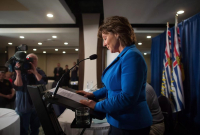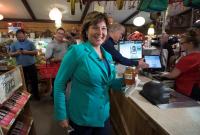Support strong Canadian climate journalism for 2025
The final count in British Columbia's tight and inconclusive election will be known on Wednesday, but the possibility of a judicial recount means the actual outcome might not be known for weeks.
The race between the Liberals and New Democrats in one key Vancouver Island riding swung back and forth on Tuesday.
The latest ballot count in the hotly contested Courtenay-Comox riding showed a 101-vote lead for New Democrat Ronna-Rae Leonard over Liberal Jim Benninger. Earlier, Benninger was ahead by three votes after starting the day 13 behind.
At stake is a one-seat Liberal majority if Benninger wins. But if Leonard wins, there could be a Liberal or NDP minority government with the support of the Green party in the 87-seat legislature.
After the May 9 election, the Liberals had 43 seats, the NDP 41 and the Greens had three seats. On election night, Leonard was ahead by nine votes in Courtenay-Comox.
"Where they stand now, it's a possibility there will be a judicial recount," said Elections BC spokesman Andrew Watson.
Elections BC did a recount in Courtenay-Comox before it began counting absentee ballots. Almost 180,000 absentee votes are being tallied provincewide as part of the agency's final count, which must be completed on Wednesday.
An application for a judicial recount must be filed with the Supreme Court of British Columbia within six days of the final result being declared.
"Within 72 hours after an application has been filed, the courts, if the application is approved, must set the date and time and the place for the judicial recount to occur and that must be set no later than eight days after that time," said Watson.
The results of the judicial recount are subject to an appeal to the B.C. Court of Appeal, he said. An appeal must be filed within two days of the judicial recount and the result of the appeal must be determined within 10 days.
"Since 1995, when the Election Act came into force, there's been four judicial recounts and none of them have gone to an appeal," Watson said.
The most recent judicial recount was after the 2013 election in Coquitlam-Maillardville riding, where 35 votes separated the Liberal and NDP candidates, which was less than 1/500 of the total ballots considered that triggers an automatic application from the district electoral officer for a judicial recount under the act.
The final vote counting was still underway in several B.C. ridings. Liberal candidate Jas Johal was declared the winner in Richmond-Queensborough by a margin of 134 votes.
As the counting continued, several groups opposed to the Site C hydroelectric dam and the Kinder Morgan pipeline expansion called for a pact between the New Democrats and Greens, if the final results produce a minority government.
A wide range of social, environmental and First Nations groups say the election result represents a chance for the two political movements to work together as a unified force.
"We have a unique and historic moment in the history of B.C. to change the course of history," said Grand Chief Stewart Phillip, president of the Union of B.C. Chiefs.
About 50 people were at the legislature to present an online petition signed by 25,000 people since the election.
Carole James, a former NDP leader, and Sonia Furstenau, a newly elected member of the legislature for the Greens, accepted the petition asking the two parties to co-operate.
James and Furstenau declined comment about negotiations that are underway between the two parties.
"I'm not going to get into specifics," said James. "We're in discussions. I'm going to leave it at that."
NDP Leader John Horgan has said his party and the Greens share political similarities when it comes to introducing reforms to the electoral system and campaign financing. The two parties are also opposed to the Kinder Morgan pipeline project and the Site C dam.
Green Leader Andrew Weaver has said there are more similarities between the Greens and NDP on major issues, but that didn't preclude his party from working with the Liberals.





Comments